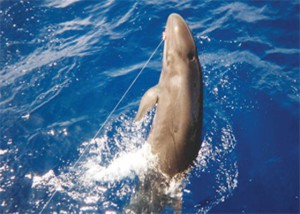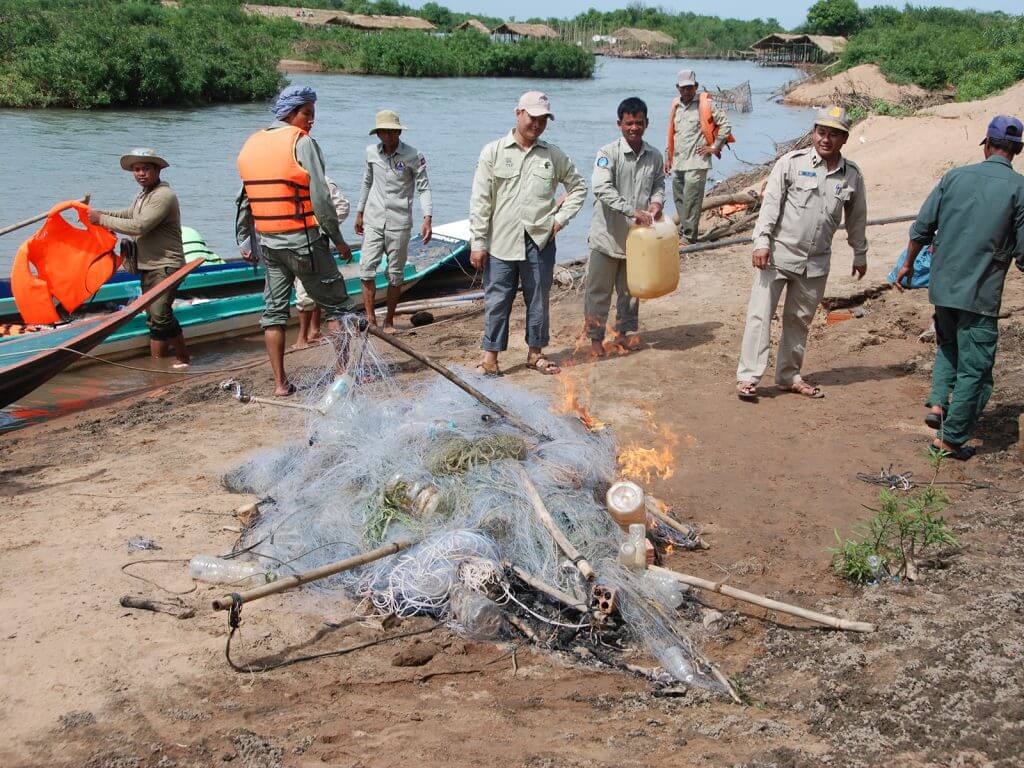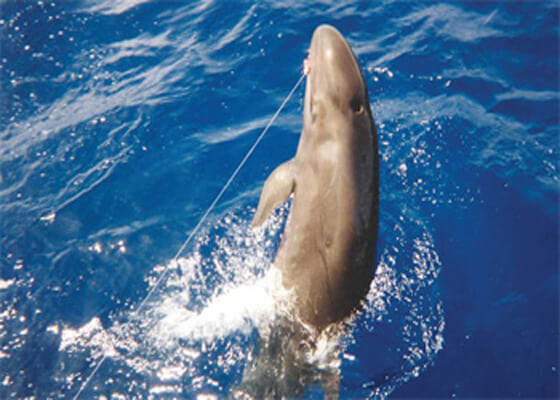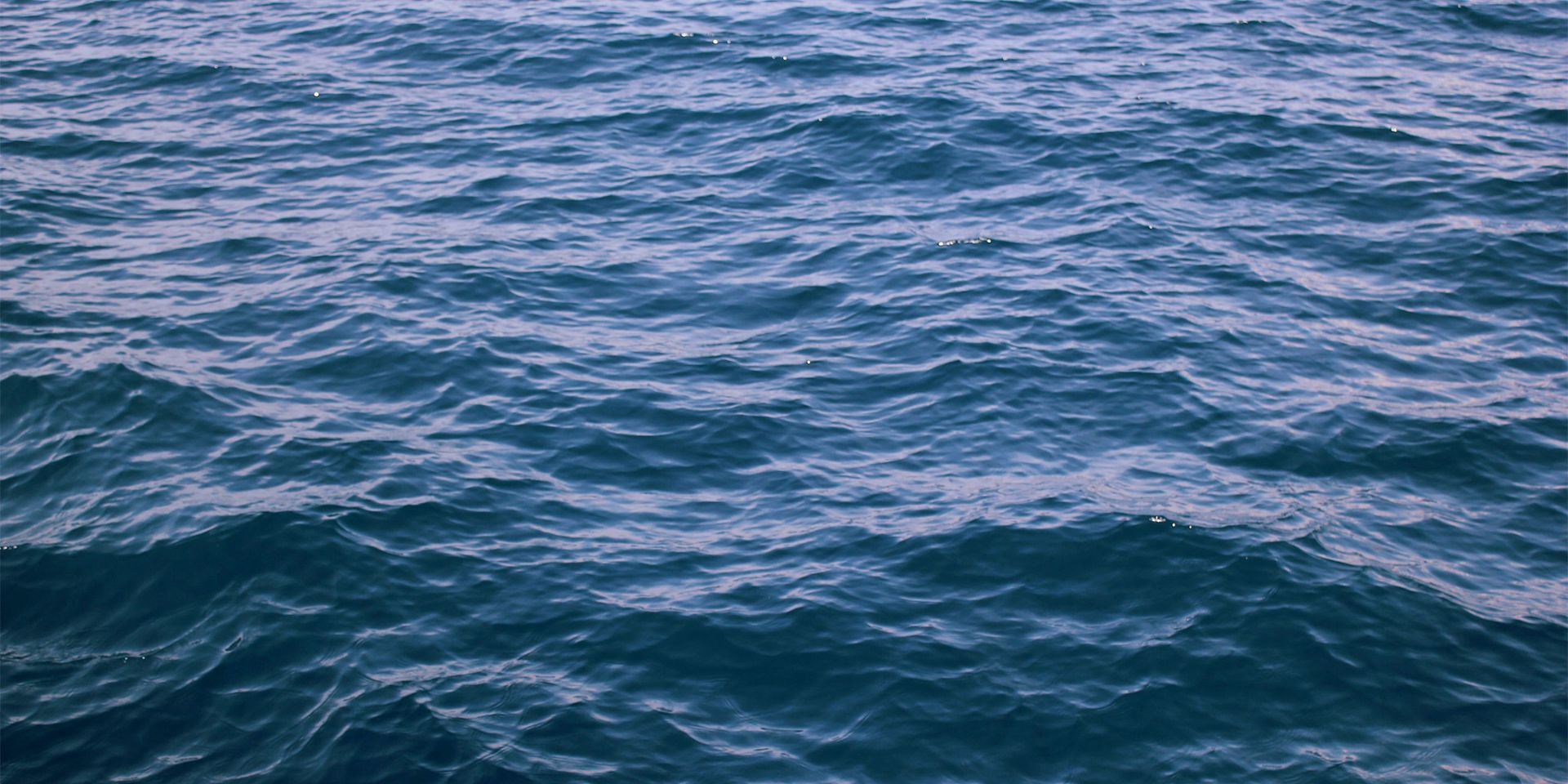Marine Mammal Bycatch
Marine mammal bycatch refers to any marine mammal adversely affected as a result of being unintentionally entangled, entrapped, or caught by nets, lines, traps, or hooks, or otherwise impacted by fishing gear. Bycatch is the greatest direct cause of marine mammal injury and death in the United States and around the world. Sections 118 and 101(a)(5)(E) of the Marine Mammal Protection Act (MMPA) requires the National Marine Fisheries Service (NMFS) and the U.S. Fish and Wildlife Service (FWS) to address marine mammal bycatch through science, gear research, and restrictions on fishing gear and practices.
National Bycatch Strategy
NMFS has developed priorities and strategies for reducing fisheries bycatch at the national level, as part of its 2016 National Bycatch Reduction Strategy, which exists to support sustainable fisheries and the recovery and conservation of protected species. Those priorities and strategies include the following:
- monitoring and estimating the rates of bycatch and bycatch mortality;
- understanding the impact of bycatch on species and community dynamics;
- developing solutions to reduce bycatch and bycatch mortality; and
- managing fisheries and enforcing regulations to reduce bycatch.
Comments submitted by the Commission on NMFS’s National Bycatch Strategy are listed under “Learn More”.
The federal management framework for monitoring and mitigating bycatch is based on assessment of the ability of marine mammal populations to sustain human-caused impacts (the sustainable ‘potential biological removal’ level, or PBR, of each stock), estimation of the numbers of animals seriously injured or killed, and take-reduction efforts based on structured consultations among fishery managers, scientists, conservationists, and fishermen on NMFS’s take reduction teams (TRTs). The Commission is an active member of each of the five recently active TRTs. The Marine Mammal Commission’s 2014 Priorities Report underscored the need for regular stock assessments for marine mammal species that are affected by bycatch. Enabling such assessments requires increased observer coverage within and across fisheries to ensure estimates of bycatch are reliable and up to date. Observed bycatch is typically a fraction of the deaths and serious injuries that actually occur so it is extrapolated to estimate the total for the entire fishery. However, many deaths go undetected because fisheries are unobserved, or would be undetected even if observers were onboard the fishing vessels. These unobserved and undetected deaths are sometimes referred to as ‘cryptic mortality’. For example, roughly two-thirds of all North Atlantic right whales deaths go undetected. The Commission has provided presentations on marine mammal cryptic mortality at two NMFS workshops to address the problem of fully accounting for deaths that are not accounted for through observer data or strandings.

Hooked false killer whale from the Hawaii long-line fishery. (Eric Forney, NOAA PIRO)
One way the Commission works toward reducing bycatch globally is through its grants and research program. In recent years (2018–2023), the Commission funded ten research projects addressing marine mammal bycatch. The Commission also regularly engages with Congress on the science and policy decisions related to marine mammal bycatch. For example, in 2016, the Commission co-hosted with the World Wildlife Fund (WWF) a Congressional briefing to increase awareness of the impacts of marine mammal bycatch at national and international levels. The Commission is also looking for ways to create economic incentives for reducing marine mammal bycatch. In September 2015, the Commission co-hosted an international workshop on incentive-based fishery bycatch measures with the NMFS. This workshop focused on incentives such as individual transferable bycatch allocations to provide greater flexibility to fishing vessel operators to reduce their marine mammal bycatch in a more cost-effective manner. In 2019, the Commission helped plan a workshop that examined economic aspects of bycatch, including how economic mechanisms can incentivize bycatch mitigation, as part of NMFS’s National Bycatch Reduction Strategy.
At the 2017 Biennial meeting of the Society for Marine Mammalogy, the Commission co-organized and co-funded a one-day international workshop on marine mammal bycatch along with WWF and NMFS. In presentations and panel discussions, workshop participants highlighted creative tools to address the challenges of data-poor, open-access, small-scale fisheries. Incentivizing measures such as market access and economic alternatives were also raised as alternative solutions for a wide variety of fisheries. The workshop report, which covers this and two other workshops on marine mammal bycatch during the meeting, can be found here.
Multilateral and regional organizations such as the FAO Committee on Fisheries and Regional Fishery Management Organizations, respectively, are key institutions in addressing global fishery bycatch. At the Indian Ocean Tuna Commission Working Party on Ecosystems and Bycatch, Marine Mammal Commission-funded scientists were able to draft an Executive Summary for cetaceans that occur in the region, where limited data suggest that bycatch interactions in coastal gillnet fisheries may be more common than previously recognized.
At the Commission’s 2019 Annual Meeting one session explored the factors affecting bycatch of odontocetes (dolphins and toothed whales) in a variety of hook-and-line fisheries in and around the Hawaiian Archipelago. At the Commission’s 2023 Annual Meeting, the closing session title, “Whales on the Brink”, considered the substantial threats facing to North Pacific and North Atlantic right whales, including entanglement in fishing gear.
Take Reduction Teams
Take Reduction Teams (TRTs) around the United States review and recommend specific bycatch reduction measures for particular fisheries (e.g., Atlantic pot/trap, California drift gillnet, Hawaii shallow- and deep-set longline) through a negotiated, multi-stakeholder process. Those measures are reflected in Take Reduction Plans (TRPs) for each fishery or group of fisheries. The TRTs are mandated to work toward the goal of reducing marine mammal bycatch to levels below PBR within six months, and to levels approaching the zero mortality rate goal (defined as 10% of PBR or less) within five years. Not all TRTs have been successful, and the Commission continues to strive for effective measures and their full implementation and enforcement through active participation on all the TRTs. The Commission’s 2015 Annual Meeting included a session examining TRT performance, with a specific discussion of the factors determining successes and challenges in some of the East Coast TRTs.
Learn more about TRTs and the development of take reduction plans.
Joining Forces to Tackle Global Bycatch

Mekong river guards of the Cambodian Fisheries Administration burn gillnets removed from within Core protected zones for the Mekong River population of Irrawaddy dolphins. (Peter Thomas, Marine Mammal Commission)
In 2016 the Commission spearheaded a global bycatch reduction initiative that was announced at the 2016 Our Ocean Conference. U.S. government agencies joined the Environmental Defense Fund, The Nature Conservancy, the Natural Resources Defense Council, and the International Seafood Sustainability Foundation to provide $1.7M to enable fishing nations to better monitor and prevent bycatch in global fisheries, supporting sustainable, ecosystem-based fisheries worldwide. The list of projects focuses on technological, policy and legal capacity building. This initiative dedicates $375K to address marine mammal bycatch on a global level. The Commission has the lead in tracking progress on this initiative and reported to the Department of State on ongoing progress on the ten elements of this initiative in preparation for the 2017 Our Oceans Conference.
The International Whaling Commission launched its Bycatch Mitigation Initiative in 2016, with the goal of developing, assessing and promoting effective bycatch prevention and mitigation measures worldwide. The Marine Mammal Commission nominated several independent scientists to the Initiative’s Expert Panel, all of whom were appointed. In 2023, one of the Commission’s staff members was appointed to the Expert Panel.
Value of Research and Fishery Bycatch Data

Hooked false killer whale from the Hawaii long-line fishery. (Eric Forney, NOAA)
Reliable bycatch data are critical to develop policy measures aimed at reducing the impacts of fisheries on marine mammals. Elements needed to accurately assess and mitigate the impacts of bycatch on marine mammals include:
- the ability to collect fishery bycatch data (e.g., through fishery observer or electronic monitoring programs),
- the ability to assess the abundance and trends of marine mammal stocks (e.g., through field surveys), and
- the ability to test the effectiveness of mitigation efforts aimed at reducing interactions between marine mammals and fishery operations.
In many cases, the insufficiency of resources for collecting accurate fisheries and marine mammal data has resulted in poor or out-of-date information, particularly those needed to calculate PBR. The uncertainty and inadequacy of data can create a need for measures that are more restrictive than necessary, leading to unwarranted economic losses in commercial fisheries. Studies have shown that a modest increase in resources to support marine mammal data collection can result in more targeted bycatch reduction measures and less impact on the “bottom line” of commercial fishermen. Additional research is needed to better understand the ecological effects of fishing on marine mammals and marine ecosystems, which are even more challenging to define, assess, and mitigate.
In 2014 and 2015 the Commission co-sponsored two workshops with NMFS to look at innovative and cost-effective ways of collecting marine mammal stock assessment data. One workshop, held in October 2014, examined the use of unmanned aerial systems (UASs or drones) to survey marine mammals, and to collect data on body condition and behavior. The second workshop, held in April 2015 focused on the use of passive acoustics deployed on fixed or towed arrays, or housed in floated buoys or autonomous underwater vehicles (gliders), to detect and estimate the density of marine mammals from their calls.
As part of the National Bycatch Reduction Strategy, the Commission assisted NMFS in the planning and execution of a workshop that in October 2019 examined the connections between the economy and bycatch, including that of protected species such as marine mammals. It was clear from the presentations and discussion that bycatch has a number of impacts on the profitability of fisheries, and that the economy has both positive and negative effects on bycatch. A workshop report will be published in 2020.
learn more
General Information
The Consortium for Wildlife Bycatch Reduction
